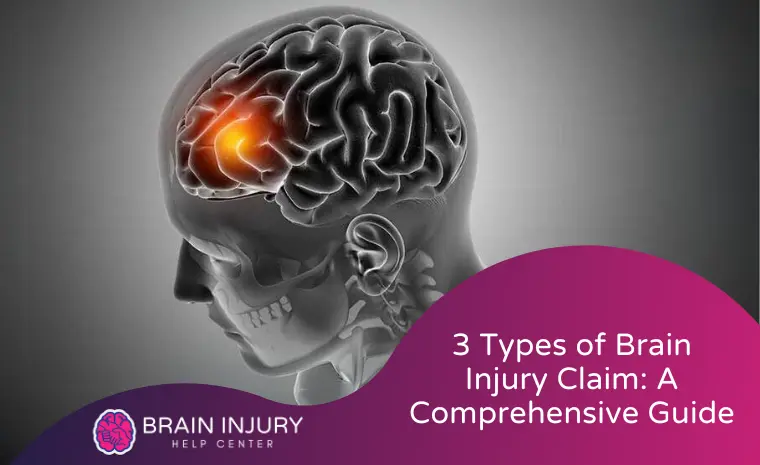In the aftermath of an accident, one of the most devastating consequences can be a brain injury. These can be life-altering events, resulting in a wide range of physical, cognitive, and emotional challenges. Not only can such an injury have a profound impact on the victim, but it can also place a significant financial and emotional burden on their family. In such cases, seeking monetary compensation through a claim may be a viable option.
In this comprehensive guide, we’ll explore three types of brain injury claim, providing insights into their complexities, legal considerations, and the importance of seeking professional assistance.
What is a Claim?
A claim represents the legal action pursued by individuals who have sustained injuries as a result of accidents or negligence. These claims seek compensation for the physical, emotional, and financial toll of the injury. Understanding the nuances of claims, particularly for brain injuries, is essential for individuals navigating the legal process after experiencing such trauma.
There are three main types of brain injury claims:
1. Traumatic Brain Injury (TBI) Claims
A TBI is caused by a sudden and forceful blow to the head or body that results in brain damage. Common causes of traumatic brain injury include car accidents, falls, sports injuries, and assaults. This type of injury can range from mild concussions to severe impairments, depending on the force and location of the impact.
Key points on TBI claims:
- Symptoms: TBIs can manifest as physical, cognitive, or emotional impairments, including loss of consciousness, headaches, memory loss, mood swings, and difficulty concentrating.
- Legal considerations: Providing liability in TBI cases requires thorough investigation and expert testimony to establish the connection between the accident and the resulting injury.
- Compensation: Damages sought in TBI claims may include medical costs, medical treatment costs, lost wages, rehabilitation costs, loss of enjoyment of life, and emotional distress.
2. Anoxic Brain Injury (ABI) Claims
This type of injury occurs when the brain is deprived of oxygen for a prolonged period, leading to cellular damage and potential long-term impairments. Anoxic brain injury can result from drowning, cardiac arrest, or strangulation.
Key points on Anoxic Brain Injury claim:
- Symptoms: Depending on the duration and severity of oxygen deprivation, symptoms may range from mild cognitive impairment to severe neurological deficits, including coma or persistent vegetative state.
- Legal considerations: Establishing liability may involve determining negligence, medical malpractice, or product liability, depending on the circumstances surrounding the injury.
- Compensation: Damages may include medical expenses, long-term care and hospital bills, lost income, and compensation for pain and suffering, both from the victim and their family members.
3. Hypoxic Brain Injury (HBI) Claims
This type of injury occurs when the brain receives insufficient oxygen, leading to cellular dysfunction and potential neurological deficits. Unlike anoxic brain injury, which involves complete oxygen deprivation, hypoxic brain injury involves partial oxygen deprivation, which can still result in significant harm.
Key point on Hypoxic Brain Injury claim:
- Causes: This injury can result from various factors, including heart attack, stroke, respiratory failure, or high-altitude exposure.
- Symptoms: Confusion, memory loss, difficulty concentrating, fatigue, and mood changes.
- Legal considerations: Proving liability may require demonstrating negligence, medical malpractice, or product liability.
- Compensation: Medical bills, rehabilitation costs, lost wages, emotional pain and suffering, and compensation for family members as loss of consortium, loss of companionship, and inheritance.

The Role of a Brain Injury Lawyer
When it comes to navigating the complexities of brain injury claims, the role of a lawyer is crucial. A lawyer serves as an advocate and guide, helping individuals who have suffered brain injuries due to accidents or negligence pursue the compensation they deserve. Let’s delve deeper into the important role that a lawyer plays in these cases:
- Legal Advocacy:
- Represents the victim’s interests in legal proceedings.
- Ensures adherence to legal requirements and deadlines.
- Builds a strong case based on evidence and applicable laws.
- Case Assessment:
- Evaluates the merits of the claim, including liability and potential compensation.
- Advises the client on the feasibility of pursuing legal action.
- Evidence Gathering:
- Collects and analyzes medical records, expert opinions, witness statements, and other relevant evidence.
- Collaborates with medical professionals and experts to establish the extent of injuries and damages.
- Negotiation and Settlement:
- Engages in negotiations with insurance companies and defense attorneys to seek fair compensation.
- Works towards a favorable settlement that addresses the victim’s needs and losses.
- Trial Preparation:
- Prepares for trial if a settlement cannot be reached.
- Develops a compelling case presentation, including witness testimony and expert evidence.
- Represents the client in court proceedings, presenting arguments and cross-examining witnesses.
- Client Support:
- Provides emotional and practical support to the victim and their family throughout the legal process.
- Keeps clients informed about the progress of the claim and addresses their concerns.
- Legal Expertise:
- Possesses in-depth knowledge of personal injury laws, precedents, and relevant case law.
- Interprets complex legal concepts and explains them clearly and understandably.
- Advocacy for Rights:
- Advocates for the victim’s rights to fair compensation and access to medical care and rehabilitation.
- Challenges unfair insurance practices and ensures that the victim’s rights are protected.
File Your Brain Injury Claim, We Can Help You Fight For Justice
If you are considering filing a personal injury claim, it is important to consult with an experienced personal injury attorney. A qualified attorney can help you assess the strength of your case, gather evidence, and negotiate with the insurance company on your behalf. Seeking financial compensation through a personal injury claim can be a complex and challenging process, but it can also be a valuable way to obtain the financial resources and support you need to rebuild your life after a traumatic event. Reach out to the Brain Injury Help Center in California for invaluable support and legal representation. Call now.









